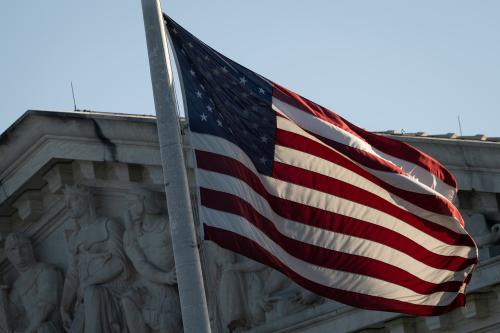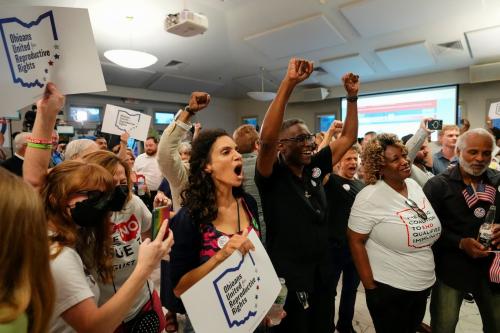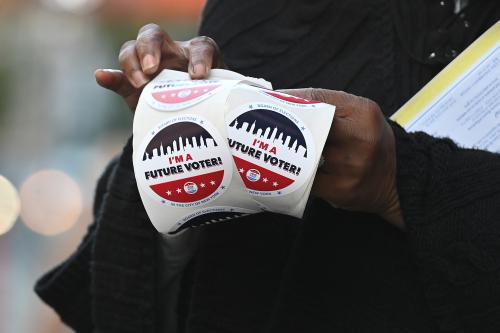From the chaos in the House of Representatives to the multiple criminal trials of a former president, there are many unprecedented events occurring in American politics, and many reasons to be concerned about the health of American democracy. For those feeling overwhelmed, disoriented or just in need of a recap, Brookings has you covered. Understanding democratic decline in the United States provides a framework for understanding the challenges to democracy in the United States, to help citizens contextualize and respond to the onslaught of news.
In the coming days, FixGov will be releasing components of the report as a blog series. First up: Four things to know about democratic erosion.
1. Democratic erosion is more subtle than a coup
For many decades, the death of a democracy was often a dramatic event: a dictator overthrowing an elected government and seizing power by force. But today, it is rare for an authoritarian to come to power via a coup.
Instead, democracies in decline usually experience a slow erosion. Elections still occur, but legislative and procedural changes make it harder to vote, harder for challengers to seriously contest incumbents, or harder to turn electoral victory into substantive policy impact. This process is often incremental and episodic. In the words of political scientists Daniel Ziblatt and Steven Levitsky:
“The electoral road to breakdown is dangerously deceptive… People still vote. Elected autocrats maintain a veneer of democracy while eviscerating its substance. Many government efforts to subvert democracy are ‘legal,’ in the sense that they are approved by the legislature or accepted by the courts.”1
Political scientists use a variety of terms to describe this phenomenon, including “democratic erosion,” “democratic backsliding,” “democratic regression,” and “autocratization.”
2. The United States has experienced democratic decline before
Before we examine democratic decline in the United States in the 21st century, it is important to recognize the historical context.
Many longstanding aspects of America’s governing institutions can reasonably be criticized as anti-democratic or as a danger to civil liberties. The Senate and Electoral College are part of the Constitution; the filibuster and the doctrine of “judicial supremacy” date to the 19th century. The United States has always relied on winner-takes-all geographically based representation, which can result in substantial misrepresentation when partisans are segregated—even absent intentional gerrymandering. In addition, though the nation’s founders saw a standing army and strong executive as dangers to the republic, the power of the presidency has steadily increased over time, and the American military has for decades been by far the most expensive in the world.
The United States has also experienced democratic reversals before. After the Civil War, during the brief period known as “Radical Reconstruction,” Black men voted and held elected office across the South. Those multiracial governments were overthrown, often violently, and over the following decades, the white supremacist regimes of the “Jim Crow” era solidified their grasp on power. The United States only achieved nearly universal suffrage after 1965, when the federal government finally protected the voting rights of Black Americans in the South. The achievements of the Civil Rights Movement have not gone uncontested since; for example, massive expansions in policing and incarceration have substantially reduced the civic and voting power of over-policed communities. Many of the pathologies that beset American governance today are best understood as a part of the long backlash to the successes of the Civil Rights movement.
3. Globally, democracy is in retreat
The idiosyncrasies of American government and the nation’s long history of race-based political exclusion create specific susceptibilities to democratic erosion, but the United States is far from alone in experiencing democratic backsliding.
Democracy is in decline around the world. For the first time in decades, there are more closed autocracies than liberal democracies in the world. Nearly three-fourths of the world’s population lives in an autocracy, and over all levels of democracy in the world have receded to levels last seen in the mid-1980s.
4. Democratic decline in the United States is not just about Trump
In recent years, experts have sounded the alarm that the United States is experiencing democratic decline.
To measure and compare the core elements of democracy across countries and across time, social scientists have developed a robust toolkit of indices that track and aggregate indicators of electoral processes, political participation, government functioning, and civil liberties. The V-Dem Liberal Democracy Index has raised alarms about autocratization in the United States since 2016. Freedom House’s “Freedom in the World” measure has reported a decade of decline in freedom in the United States.
According to the Economist’s Democracy Index, the United States now ranks not among the world’s “full democracies” (such as Canada, Japan, and most of Western Europe) but among the “flawed democracies” (such as Greece, Israel, Poland, and Brazil).
Across the board, the major democracy indices demonstrate substantial erosion of democratic functioning in the United States.
It is notable that this erosion long precedes the shocking events that followed the 2020 election, when the sitting president of the United States, knowing that he had failed to win re-election, nonetheless refused to concede, sought to subvert the vote counting and certification process, and encouraged his supporters to storm the Capitol. And, though several indices indicate improvement in democratic functioning since 2020, the health of democracy in the United States has not rebounded to the level of the early 2000s. Though the elections in 2022 were reassuring from the perspective of democratic functioning, we have not seen a change in the fundamental political dynamics driving the erosion of U.S. democracy. Democratic decline in the United States is not just about Donald Trump.
What factors have been driving experts to downgrade U.S. democracy? Two key issues are the freedom and fairness of elections and the expansion of executive power. Those issues will each be the subject of a blog later this week—or you can read about them now in the full report, Understanding democratic decline in the United States.
-
Footnotes
- Levitsky, S., & Ziblatt, D. (2019). How democracies die. Crown. p. 5.
The Brookings Institution is committed to quality, independence, and impact.
We are supported by a diverse array of funders. In line with our values and policies, each Brookings publication represents the sole views of its author(s).








Commentary
Four things to know about democratic erosion
October 18, 2023